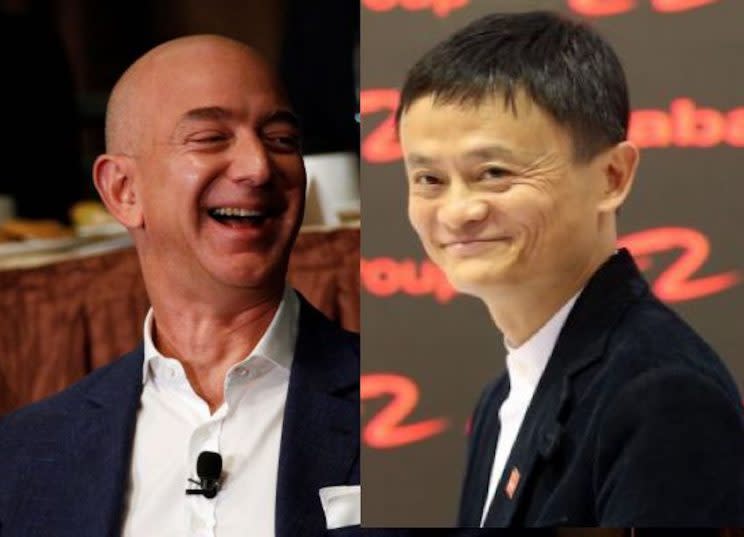Think you’re buying on Amazon? It’s actually from Alibaba
Peter Koch, a 37-year-old engineer living in Serbia, says he’s making $3,000 every month by selling the same seven baby products on Amazon (AMZN) to American customers. His secret? Chinese e-commerce giant Alibaba (BABA).
As one of the third-party sellers who contribute to more than half of Amazon’s sales, Koch began importing goods from Chinese manufacturers he connected with through Alibaba in 2014.
Koch is likely far from the only third-party seller to make money selling products from Alibaba on Amazon. A number of individuals on both Quora and Reddit have discussed how to buy goods from Chinese manufacturers and sell on Amazon. John Frigo, an e-commerce veteran based in Chicago, posted a video on YouTube saying he made $250,000 in sales a month that way. It has attracted nearly 1.5 million viewers.
Products made in China tend to be particularly inexpensive for Amazon’s third-party sellers.
“I tried to explore if there is any possibility to source from other countries,” Koch told Yahoo Finance. “Unfortunately, there isn’t. I managed to find places where the price of each piece is lower than China, but the shipping cost is much higher.”
How third-party sellers profit from Alibaba and Amazon
Third-party sellers make their profit from markups. Frigo sells products on Amazon ranging from beach tents to cooler bags, which he originally buys on Alibaba. To ensure profitability under Amazon’s return policy and fierce market competition, he makes the retail price three times what he pays on Alibaba.
Once a product becomes a hit, sellers tend to follow the trend and flood the market. The latest example is the fidget spinner. The toy took off in April, and now more than 9,000 spinners are listed on Amazon. The unit price ranges from $1 to $100.

“There is not much difference in those products, and some of them may come from the same Chinese manufacturer,” Frigo said. “What sets you apart is how you do the marketing.”
A successful seller usually identifies popular products in the early stage, and then customizes them to cater to market needs and build a brand. Every month, Frigo uses software and social media to stay on top of the next big thing.
Made by Alibaba, shipped by Amazon
The Fulfillment by Amazon (FBA) service enables Koch to sell to the US, a country he’s never set foot in. After sellers ship their products directly from Chinese factories to Amazon’s warehouses in the US, Amazon will “pick, pack, ship, and provide customer service for these products,” according to the company’s website.
In 2016, more than 2 billion items were delivered by FBA and the number of sellers using the service grew more than 70%.
Amazon requires packages delivered by third-party sellers to contain labels listing sellers’ information. Without seeing or touching his products, Koch asks manufacturers to stick private labels with his information on the boxes. He says some factories in China add these labels for free, while others ask for $20 to stick labels on 1,000 pieces.
“We have sent (to Amazon’s warehouses) so often, by FedEx or DHL,” Elizabeth Li, a saleswoman for a fidget spinner maker on Alibaba, told Yahoo Finance.

So if you’re an Amazon customer, it’s almost impossible for you to tell whether the product comes from an American seller or a factory in China. Third-party sellers use the FBA to avoid having to store their inventory and to reduce shipping time.
But to Frigo, this could be a riskier model. “They are not actually handling the product,” he says. “They don’t know what the customer is receiving.”
Quality inspection: whose responsibility?
Unlike Alibaba, which is a platform for individual sellers, Amazon owns many of the products it sells to customers — so it can guarantee quality and delivery service. But as the number of third-party sellers grows, Amazon may face quality-control and counterfeit problems that have plagued Alibaba for years now.
Indeed, customers who buy products delivered by FBA may end up testing their quality themselves and writing a review that could make or break a product. “Review is everything,” Frigo said.
Amazon requires everything sold to “comply with all laws and regulations and with Amazon’s policies.” But when sellers skip the quality-inspection part, it becomes harder for people to notice potential problems until things go really wrong.
In late 2015, hoverboard fever took over the holiday gift market. It was only after the products exploded and caught fire that Amazon asked sellers for documentation showing listed hoverboards complied with “applicable safety standards,” one manufacturer told CNN. Amazon ultimately stopped the sale of most hoverboard models, according to CNN.
“Who is actually responsible for making sure products are in compliance with American standards in the Amazon’s FBA model is a gray area that has not been clarified yet,” Renaud Anjoran, president at China Manufacturing Consultants, told Yahoo Finance. “Consumers can easily tell if the product works by trying it, but it’s not like they would pay to test if it’s in compliance with standards.”
If you’re just starting out as an Amazon seller and want to avoid such product disasters, Anjoran’s advice is pretty simple: “Avoid anything for kids, electronics, anything with food.”
An Amazon spokesperson declined to comment on the record for this story.
—
Krystal Hu is a reporter at Yahoo Finance. Send your shopping experience with third-party sellers on Amazon to krystalh@yahoo-inc.com
Read more:
Alibaba wants to be more than the Amazon of China – Yahoo Finance
Meet the Harvard Business School professor who’s going to try to fix Uber

